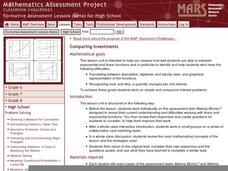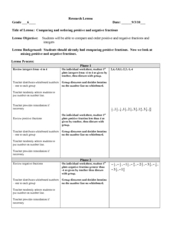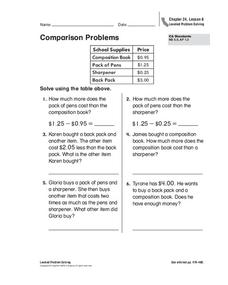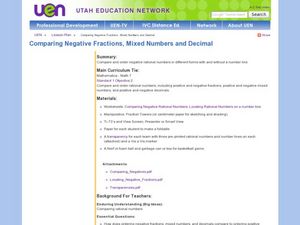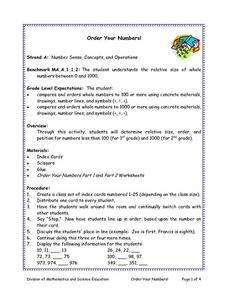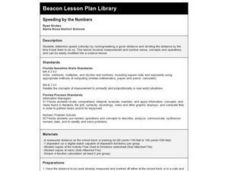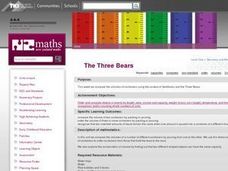Curated OER
Yummy Math
Young mathematicians use bags of Skittles to help them gain practice in graphing and organizing data. They work in pairs, and after they have counted and organized their Skittles, they access a computer program which allows them to print...
Curated OER
Comparing Investments
Money, money, money. A complete lesson that makes use of different representations of simple and compound interest, including written scenarios, tables, graphs, and equations to highlight similarities and differences between linear and...
Blogger
Integer Operations Posters
Eliminate young mathematicians' confusion over performing operations with integers using this set of classroom displays. Providing learners with simple, easy-to-follow rules, this resource will have students fluently adding, subtracting,...
Illustrative Mathematics
Graphing Rational Functions
The slider feature on Desmos excellently shows how graphs change based on different variable values. Learners look at two similar rational functions and compare and discuss what happens when the numbers go from positive to zero to...
Shodor Education Foundation
Experimental Probability
Spin into a dicey experiment. Pupils use a spinner or a pair of dice to determine the experimental probabilities of each outcome. The interactive allows for either, one, five, or ten consecutive experiments. Using the applet, learners...
Curated OER
Using Random Sampling to Draw Inferences
Emerging statisticians develop the ability to make inferences from sample data while also working on proportional relationships in general. Here, young learners examine samples for bias, and then use random samples to make inferences...
Corbett Maths
The Range
Spread the data out on the range. The short video provides a definition of the range. Using a data set of five numbers, the resource calculates the range.
US Department of Commerce
Make Data Speak
Data displays are more than just a bunch of numbers. Small groups access census results and create eye-catching data displays. Teams choose a statistic and collect data points for five locations. Classmates present their infographics to...
Curated OER
Comparing and Ordering Positive and Negative Fractions
The comparison and ordering of positive and negative fractions is the focus of this math lesson. Sixth graders are given one card each that has a fraction written on it, and they must put themselves into the proper order in a "human...
Curated OER
Multiplying Decimal Numbers: Using Zeros as Placeholders
Explore decimals with upper graders. They solve problems from their textbook involving decimal multiplication. Afterward, as a class, they check their answers by comparing them to those projected with an overhead projector.
Curated OER
Comparison Problems
In this comparing numbers learning exercise, students complete several word problems by subtracting the number from the table for the school supply costs. Students subtract to compare the prices of the items.
Curated OER
Negative Numbers on the Number Line Using the TI-83
In this negative numbers learning exercise, students use the TI-83 calculator to compare the value of negative numbers. Students explain in short answer format how they used the calculator to determine their answers.
Curated OER
Comparing Positive Fractions, Mixed Numbers & Decimals
Seventh graders explore the concept of fractions, mixed numbers, and decimals. In this fractions, mixed numbers, and decimals lesson, 7th graders compare different forms of rational numbers on a number line. Students order rational...
Curated OER
Comparing Negative Fractions, Mixed Numbers and Decimal
Seventh graders explore the concept of negative rational numbers. In this negative rational numbers lesson, 7th graders discuss similarities between positive and negative rational numbers. Students predict what rational numbers lie...
Curated OER
Order Your Numbers
Students examine the order of whole numbers that range from 0 to 1,000. They compare and contrast the quantities of different numbers using the number line, objects, and symbols of comparison. Students also work as a class with cards to...
Curated OER
Comparing and Ordering Fractions and Mixed Numbers
In this mathematics worksheet, 5th graders find the least common denominator of each fraction. Then they write equivalent fractions using the LCD and compare the numerators of the new fractions.
Curated OER
Two-Digit Numbers Ending in 8 or 7
In this mathematics instructional activity, students circle the dots to form a complete ten and compare their problem to the one with just ones' digits. Then they add each problem and write down the corresponding problem with just the...
Curated OER
Greater Than, Less Than, and Equal To
In this comparing numbers worksheet, students use a number line from zero to twenty to compare sets of two numbers and choose from multiple choices is less than, is greater than, or is equal to. Students solve 18 problems.
Curated OER
Quiz: Comparing and Ordering Whole Numbers
In this whole numbers instructional activity, 5th graders compare and order 10 sets of numbers. Each number ranges from four to eight digits. Students must read a table and read numbers in word form as well.
Curated OER
The Meaning of Whole Numbers
In this whole numbers worksheet, students fill in different charts asking about the place value of various whole numbers. Students complete 8 problems.
Curated OER
Using Negative Numbers
Sixth graders practice using negative numbers by completing number equations. In this math problem solving lesson, 6th graders discuss the different ways negative numbers can be used in a math problem and practice completing equations...
Curated OER
Speeding By The Numbers
Students determine speed by running or walking a given distance and dividing the distance by the time it took them to do so. They record their average speed and compare it with the speeds of other moving objects.
Curated OER
The Three Bears: Comparing and Ordering
Students explore comparing and ordering volume of containers. They use the context of Goldilocks and the Three Bears to compare the volume of various containers by packing or pouring.
Curated OER
Representing Numbers to 50
In this mathematics worksheet, 1st graders identify two-digit numbers that show tens and ones. Then they write how many tens and ones there are and place the number in the boxes given.



